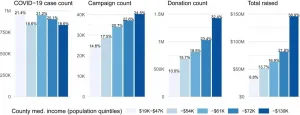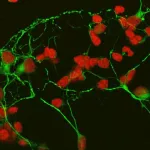The team found that community pharmacists, as a 'skilled clinical workforce', could positively contribute, supporting the community in which they serve - by playing a critical role in ongoing COVID-19 vaccination campaigns.
The researchers working on the PERISCOPE study found that community pharmacy is uniquely placed to support individuals, because it is seen by the public as a credible, trustworthy service, which could be key to any future clinical role it might play, especially where addressing vaccine hesitancy in 'hard to reach' communities. They are therefore calling on decision-makers to endorse and provide their support for a clearly defined public health role for community pharmacy.
Across the UK, community pharmacy is a critical part of primary care. According to the Kings Fund, as of the end of March 2019, there were more than 11,500 community pharmacies in England alone. It is viewed as one of the four pillars of the primary care system, along with general practice, optical services and dentistry. It has also, in areas of the UK, helped to deliver COVID-19 vaccinations.
The study included partners from the Universities of Sheffield, Oxford, Hull and Bradford in the UK, as well as internationally, the University of British Columbia and University of Tasmania. The group reviewed more than a hundred documents including peer reviewed articles, blogs and websites on the role of community pharmacy during COVID-19 and other previous pandemics.
Their findings were discussed with more than 30 health professionals and members of the public, to ensure that the findings made sense in the real world. Health professionals included pharmacists, pharmacy technicians, dispensers, counter assistants, and GPs, together with members of the public from a range of diverse ethnic backgrounds.
Several recommendations were made by the researchers from the findings of the study. Most significantly the group found it was imperative that policy and practice should focus on the clinical role of community pharmacy.
Dr Ian Maidment, reader in clinical pharmacy at Aston University and former community pharmacist leading PERSICOPE, said:
"We need to use community pharmacy to a much greater extent for COVID-19 vaccination, particularly for boosters against new variants such as the Delta (Indian) variant. The current model (for example, the large hubs) may not be sustainable in the longer term, particularly if annual COVID-19 vaccination is required.
"Our work found some key ways to make this happen. The easy access and local convenience of high street pharmacies makes them an ideal location for vaccinating at-risk populations."
The study includes guidance for policy makers:
* Have a clear role for community pharmacy in response to the public health agenda, with that role championed by decision-makers * Involve frontline community pharmacists in the development of policy and service specification in relation to vaccination * Provide prompt, clear, consistent guidelines with adequate detail and enough flexibility to allow community pharmacies to adapt the guidelines to meet the needs of their local population * Provide adequate funding and reimbursement for the delivery and necessary adaptations of any new services community pharmacies are asked to deliver * Provide pharmacy teams with adequate systems to deliver this new role and then trust them to deliver.
Hadar Zaman, head of pharmacy and medical sciences at University of Bradford and a community pharmacist, said:
"Our research has highlighted the important role community pharmacy has played in overcoming vaccine hesitancy, particularly in ethnic minority communities who have been disproportionately affected by COVID and subsequent mortality.
"What comes out very strongly, especially in areas of high social deprivation, is that community pharmacists have worked very closely with their local communities addressing concerns around vaccine safety.
"It is through these strongly rooted relationships in local communities that we will ensure vaccine uptake rates in ethnic minority and the wider population can be further improved. Therefore, community pharmacy needs to be seen as an essential delivery partner if the Government is to achieve its national vaccination coverage in the short and long term".
PERISCOPE searched for the best evidence across the world and the team included international collaborators. The findings therefore have international relevance.
Maura MacPhee, professor of nursing, University of British Columbia and member of the research team, said: "Our review findings and recommendations for decision-makers, community pharmacists and pharmacy users are adaptable and relevant internationally, including my country, Canada, where community pharmacy has a major role to play in COVID-19 vaccination programmes."
Juanita Breen, also a member of the PERISCOPE team and associate professor of dementia studies at Wicking Dementia Centre, School of Health and Medicine, University of Tasmania, added: "This study demonstrates how pharmacists can contribute towards this important public health initiative and enhance the uptake of the vaccine.
"It provides important learnings for other countries on how best to utilise the skills of our most accessible health professional - the community pharmacist."
Professor Claire Anderson, chair of the Royal Pharmaceutical Society's English Board said:
"This research clearly demonstrates the vital role community pharmacy has played during the pandemic, providing essential advice to communities and tackling health inequalities in areas of high social deprivation.
"Policy makers and commissioners need to take forward the recommendations of this research and ensure the strengths of the community pharmacy network are maximised for the benefits of patients."
Alastair Buxton, director of NHS Services at the Pharmaceutical Services Negotiating Committee, said: "This research provides a timely examination of the role community pharmacy teams have played in supporting their communities to fight back against COVID-19.
"By keeping their doors open throughout, pharmacies have maintained day-to-day activities, and managed increased demand for many services - including advice on the management of minor illness. They have also substantially increased the number of flu vaccinations administered and played a key part in the COVID-19 vaccination programme. "These findings will help guide policy in the later stages of the pandemic and guide practice in any future pandemics."
Tony Kelly, a diabetes ambassador, Diabetes Strategic Patient Partner - NHS Birmingham and Solihull Clinical Commissioning Group and member of PERISCOPE, said:
"Community pharmacists are ideally placed at the forefront of the vaccination agenda as they are the nucleus of ethnically diverse communities and are often the first point of contact for most people."
INFORMATION:
PERISCOPE was jointly funded by UK Research and Innovation (UKRI) and the National Institute for Health Research (NIHR).



